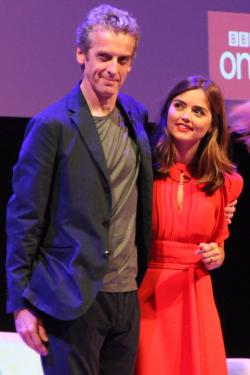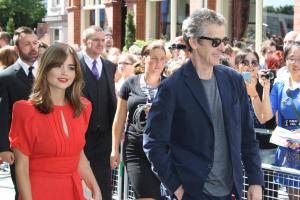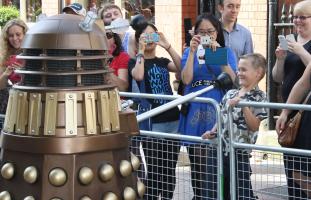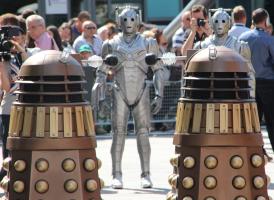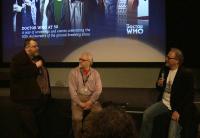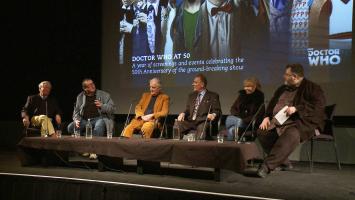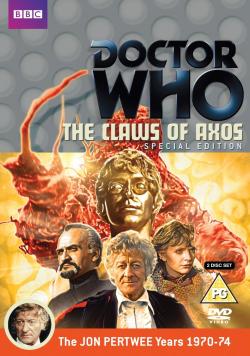Robot of Sherwood
Saturday, 6 September 2014 - Reviewed by
Back when Robin Hood - Prince of Thieves was bringing in the punters at cinema screens, Doctor Who was looking like a completely finished tv franchise. Few loyal viewers or die-hard fans could imagine it coming back stronger than ever and being confident enough to be more varied in tone and subject matter on a weekly basis than the original run generally aspired to. Time has perhaps not been kind to the blockbuster epic which featured Kevin Costner sound distinctly American, yet the film has also managed to enter the public’s consciousness on quite a deep level. Certainly many adult viewers of this latest episode will almost find it surreally familiar in that special way that Doctor Who can be. Perhaps it is a surprise that our great TV show has never directly featured the heroic outlaw and his ‘merry’ band of men.
This episode from the pen of Mark Gatiss is in some respects refreshingly linear – there is little that requires the viewer to connect the dots on their own initiative, and each scene builds on the next in a straightforward if predictable fashion. Of course there are some revelations as not all is as it appears to be, and notably the Doctor ends up not being proved totally correct, and that is in part due to his rather protective stance towards Clara. A good tribute to the river fight featured in the celebrated story sees the Doctor takes on Robin on a narrow bridge over the river. It is a nice moment that exposes some of the Doctor’s vanity and pride. However much later in the episode it is emulated in a manner that takes away the crucial drama and also feels self-indulgent.
The direction, design, music and acting is mostly solid – although the key role of Robin Hood is just a little under-cooked both in script and performance - if by no means badly done. Although Robin sounds authentic enough, there is perhaps too much obvious effort of him conveying energy and roguish charm, rather than just embodying those qualities. Right from his first appearance where he declares that he has answered the Doctor’s call with a pronounced wink the viewer will not be bored by this Robin, but perhaps will also not focus on what makes him tick either. On the plus side, anytime that Tom Riley interacts with Jenna Coleman, there is a definite sense of chemistry and Robin is more believable. For the most part though he feels like having just one persona of ‘gung ho’, ‘flippant’, ‘romantic’ or ‘agitated’ and there is little complexity that the best guest characters have had in modern Doctor Who.
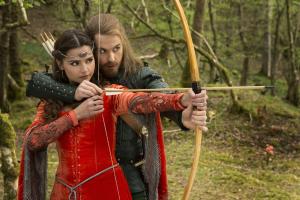 Peter Capaldi has many of the best lines from Gatiss’ script and at this point in series 8 I have now been able to adjust to his rapid fire diction (that contrasts with Matt Smith's more deliberate manner). He has so many ways to convey emotion and like all strong Doctors has the right bland of humanity and alien detachment. Notably he is somewhat less cold than the preceding week’s adventure with the Daleks but then this story is a decidedly jolly romp and has little pretentions to be something else underneath the surface. There is even some modesty in the early scenes when Clara again reaffirms her belief in the Doctor as the definitive well-meaning person to which he responds that he is just ‘passing the time’ – a nice little pun which is played straight. The Doctor’s cynicism over this forest/castle environment actually being the late 12th century and perhaps something rather more artificial is a brave move and yet just what the new season has been putting forward so far with the lead character. Clearly Steven Moffatt and Peter Capaldi have put a lot of work into making this latest incarnation stand out distinctly from Doctors 10 and 11.
Peter Capaldi has many of the best lines from Gatiss’ script and at this point in series 8 I have now been able to adjust to his rapid fire diction (that contrasts with Matt Smith's more deliberate manner). He has so many ways to convey emotion and like all strong Doctors has the right bland of humanity and alien detachment. Notably he is somewhat less cold than the preceding week’s adventure with the Daleks but then this story is a decidedly jolly romp and has little pretentions to be something else underneath the surface. There is even some modesty in the early scenes when Clara again reaffirms her belief in the Doctor as the definitive well-meaning person to which he responds that he is just ‘passing the time’ – a nice little pun which is played straight. The Doctor’s cynicism over this forest/castle environment actually being the late 12th century and perhaps something rather more artificial is a brave move and yet just what the new season has been putting forward so far with the lead character. Clearly Steven Moffatt and Peter Capaldi have put a lot of work into making this latest incarnation stand out distinctly from Doctors 10 and 11.
Rather fittingly the gloriously wicked Sheriff of Nottingham also has feelings towards Clara and probably appreciates her more for who she is – a thoroughly capable independent woman who knows her abilities and doesn’t talk around subjects. The way that Ben Miller comes across as a despicable and yet thoroughly charismatic and engaging character is a big plus for this episode, but certainly no surprise given how strong a career this versatile performer has had thus far. The episode also has a very clever variant on the usual background to the Sheriff – his ambitions in general are revealed to be rather bigger than scale than many previous portrayals of the character in yesteryear.The only drawback is that Miller is so strong that when he eventually faces Robin in a key battle towards the end all the attention and excitement seems to centre around him. Of course many villains in film and tv steal the show, but it still feels jarringly lopsided – given how much screen time Robin has as well.
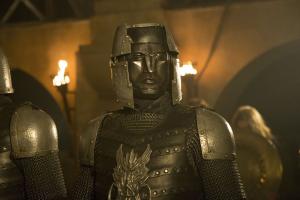 The episode has a lot of snappy elements to enjoy. One of the really funny moments involves a contest to find the best archer in land. The Doctor's marksmanship being top-notch somehow feels right for the Twelfth Doctor, and it is good to see him with a weapon other than sonic screwdriver .. for a few moments anyway. The prize of the golden arrow is tied into plot well, making this sequence not only entertaining but also key to the story. Less positively some dialogue comes off as cod-mediaeval, reminding me of 'The King's Demons' from the early 1980s. Despite the deliberate choice to set the story in the time of King John, I feel that the writer did not mean to pay tribute to a rather mediocre Peter Davison adventure. However the finale to the main story has some sharp dialogue and sharp combat which perhaps ends in a slightly slapstick way but is shot stylishly all the same. The Doctors involvement in final resolution is well done and quite a heart-warming moment that will resonate with many viewers perhaps unused to an older looking Doctor. Following that is a clever coda which pays off the viewer looking for clues over the identity of a supporting character with fairly limited screen time.
The episode has a lot of snappy elements to enjoy. One of the really funny moments involves a contest to find the best archer in land. The Doctor's marksmanship being top-notch somehow feels right for the Twelfth Doctor, and it is good to see him with a weapon other than sonic screwdriver .. for a few moments anyway. The prize of the golden arrow is tied into plot well, making this sequence not only entertaining but also key to the story. Less positively some dialogue comes off as cod-mediaeval, reminding me of 'The King's Demons' from the early 1980s. Despite the deliberate choice to set the story in the time of King John, I feel that the writer did not mean to pay tribute to a rather mediocre Peter Davison adventure. However the finale to the main story has some sharp dialogue and sharp combat which perhaps ends in a slightly slapstick way but is shot stylishly all the same. The Doctors involvement in final resolution is well done and quite a heart-warming moment that will resonate with many viewers perhaps unused to an older looking Doctor. Following that is a clever coda which pays off the viewer looking for clues over the identity of a supporting character with fairly limited screen time.
The biggest compliment I can give the episode ultimately is that it sets out to achieve its key objectives and it firmly establishes the Doctor/ Clara dynamic as something with a lot of substance. As much as I liked Jenna Coleman’s work from day one, she has really progressed now and Moffatt and his writing team now seem to know how to maximise the character’s effectiveness; something that was not always apparent in episodes like Nightmare of Silver for instance. Also the Doctor's arrogance is skilfully measure by Gatiss and it is also good to see him clearly concerned for Clara's safety having been rather casual about her in the second episode.
Finally -all fans of classic make sure you don't miss the ship's database scene as a clever cameo by one of the early Doctors ties in neatly with the main story.
This episode from the pen of Mark Gatiss is in some respects refreshingly linear – there is little that requires the viewer to connect the dots on their own initiative, and each scene builds on the next in a straightforward if predictable fashion. Of course there are some revelations as not all is as it appears to be, and notably the Doctor ends up not being proved totally correct, and that is in part due to his rather protective stance towards Clara. A good tribute to the river fight featured in the celebrated story sees the Doctor takes on Robin on a narrow bridge over the river. It is a nice moment that exposes some of the Doctor’s vanity and pride. However much later in the episode it is emulated in a manner that takes away the crucial drama and also feels self-indulgent.
The direction, design, music and acting is mostly solid – although the key role of Robin Hood is just a little under-cooked both in script and performance - if by no means badly done. Although Robin sounds authentic enough, there is perhaps too much obvious effort of him conveying energy and roguish charm, rather than just embodying those qualities. Right from his first appearance where he declares that he has answered the Doctor’s call with a pronounced wink the viewer will not be bored by this Robin, but perhaps will also not focus on what makes him tick either. On the plus side, anytime that Tom Riley interacts with Jenna Coleman, there is a definite sense of chemistry and Robin is more believable. For the most part though he feels like having just one persona of ‘gung ho’, ‘flippant’, ‘romantic’ or ‘agitated’ and there is little complexity that the best guest characters have had in modern Doctor Who.
 Peter Capaldi has many of the best lines from Gatiss’ script and at this point in series 8 I have now been able to adjust to his rapid fire diction (that contrasts with Matt Smith's more deliberate manner). He has so many ways to convey emotion and like all strong Doctors has the right bland of humanity and alien detachment. Notably he is somewhat less cold than the preceding week’s adventure with the Daleks but then this story is a decidedly jolly romp and has little pretentions to be something else underneath the surface. There is even some modesty in the early scenes when Clara again reaffirms her belief in the Doctor as the definitive well-meaning person to which he responds that he is just ‘passing the time’ – a nice little pun which is played straight. The Doctor’s cynicism over this forest/castle environment actually being the late 12th century and perhaps something rather more artificial is a brave move and yet just what the new season has been putting forward so far with the lead character. Clearly Steven Moffatt and Peter Capaldi have put a lot of work into making this latest incarnation stand out distinctly from Doctors 10 and 11.
Peter Capaldi has many of the best lines from Gatiss’ script and at this point in series 8 I have now been able to adjust to his rapid fire diction (that contrasts with Matt Smith's more deliberate manner). He has so many ways to convey emotion and like all strong Doctors has the right bland of humanity and alien detachment. Notably he is somewhat less cold than the preceding week’s adventure with the Daleks but then this story is a decidedly jolly romp and has little pretentions to be something else underneath the surface. There is even some modesty in the early scenes when Clara again reaffirms her belief in the Doctor as the definitive well-meaning person to which he responds that he is just ‘passing the time’ – a nice little pun which is played straight. The Doctor’s cynicism over this forest/castle environment actually being the late 12th century and perhaps something rather more artificial is a brave move and yet just what the new season has been putting forward so far with the lead character. Clearly Steven Moffatt and Peter Capaldi have put a lot of work into making this latest incarnation stand out distinctly from Doctors 10 and 11. Rather fittingly the gloriously wicked Sheriff of Nottingham also has feelings towards Clara and probably appreciates her more for who she is – a thoroughly capable independent woman who knows her abilities and doesn’t talk around subjects. The way that Ben Miller comes across as a despicable and yet thoroughly charismatic and engaging character is a big plus for this episode, but certainly no surprise given how strong a career this versatile performer has had thus far. The episode also has a very clever variant on the usual background to the Sheriff – his ambitions in general are revealed to be rather bigger than scale than many previous portrayals of the character in yesteryear.The only drawback is that Miller is so strong that when he eventually faces Robin in a key battle towards the end all the attention and excitement seems to centre around him. Of course many villains in film and tv steal the show, but it still feels jarringly lopsided – given how much screen time Robin has as well.
 The episode has a lot of snappy elements to enjoy. One of the really funny moments involves a contest to find the best archer in land. The Doctor's marksmanship being top-notch somehow feels right for the Twelfth Doctor, and it is good to see him with a weapon other than sonic screwdriver .. for a few moments anyway. The prize of the golden arrow is tied into plot well, making this sequence not only entertaining but also key to the story. Less positively some dialogue comes off as cod-mediaeval, reminding me of 'The King's Demons' from the early 1980s. Despite the deliberate choice to set the story in the time of King John, I feel that the writer did not mean to pay tribute to a rather mediocre Peter Davison adventure. However the finale to the main story has some sharp dialogue and sharp combat which perhaps ends in a slightly slapstick way but is shot stylishly all the same. The Doctors involvement in final resolution is well done and quite a heart-warming moment that will resonate with many viewers perhaps unused to an older looking Doctor. Following that is a clever coda which pays off the viewer looking for clues over the identity of a supporting character with fairly limited screen time.
The episode has a lot of snappy elements to enjoy. One of the really funny moments involves a contest to find the best archer in land. The Doctor's marksmanship being top-notch somehow feels right for the Twelfth Doctor, and it is good to see him with a weapon other than sonic screwdriver .. for a few moments anyway. The prize of the golden arrow is tied into plot well, making this sequence not only entertaining but also key to the story. Less positively some dialogue comes off as cod-mediaeval, reminding me of 'The King's Demons' from the early 1980s. Despite the deliberate choice to set the story in the time of King John, I feel that the writer did not mean to pay tribute to a rather mediocre Peter Davison adventure. However the finale to the main story has some sharp dialogue and sharp combat which perhaps ends in a slightly slapstick way but is shot stylishly all the same. The Doctors involvement in final resolution is well done and quite a heart-warming moment that will resonate with many viewers perhaps unused to an older looking Doctor. Following that is a clever coda which pays off the viewer looking for clues over the identity of a supporting character with fairly limited screen time. The biggest compliment I can give the episode ultimately is that it sets out to achieve its key objectives and it firmly establishes the Doctor/ Clara dynamic as something with a lot of substance. As much as I liked Jenna Coleman’s work from day one, she has really progressed now and Moffatt and his writing team now seem to know how to maximise the character’s effectiveness; something that was not always apparent in episodes like Nightmare of Silver for instance. Also the Doctor's arrogance is skilfully measure by Gatiss and it is also good to see him clearly concerned for Clara's safety having been rather casual about her in the second episode.
Finally -all fans of classic make sure you don't miss the ship's database scene as a clever cameo by one of the early Doctors ties in neatly with the main story.
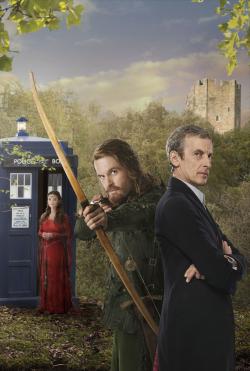
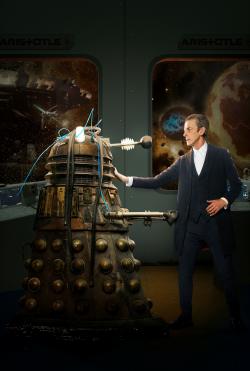
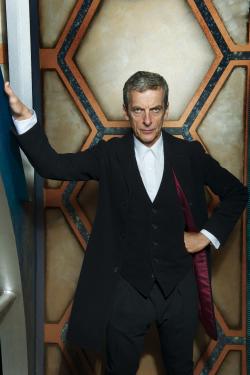 Series openers have always got a lot to contend with; they have to balance between welcoming back older viewers who are expecting more of what they watched the show previously for, and also welcoming new viewers to the fold who may not know what the show is about. With Doctor Who that can be even harder, with nigh on ten years of new adventures continuing a show now literally in its golden years, under unabated media scrutiny and audience expectation. Then, throw a new Doctor into the mix ...
Series openers have always got a lot to contend with; they have to balance between welcoming back older viewers who are expecting more of what they watched the show previously for, and also welcoming new viewers to the fold who may not know what the show is about. With Doctor Who that can be even harder, with nigh on ten years of new adventures continuing a show now literally in its golden years, under unabated media scrutiny and audience expectation. Then, throw a new Doctor into the mix ...